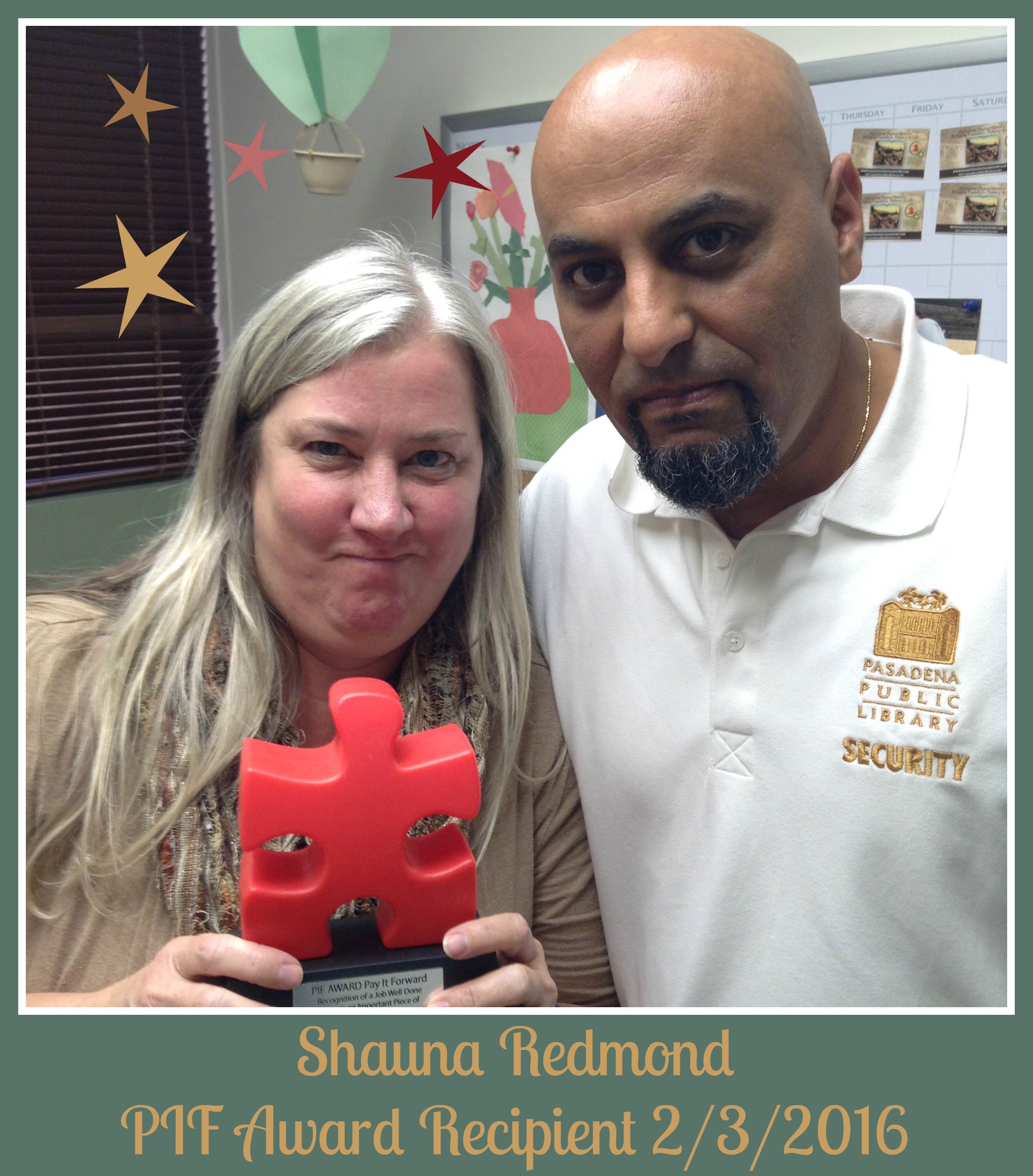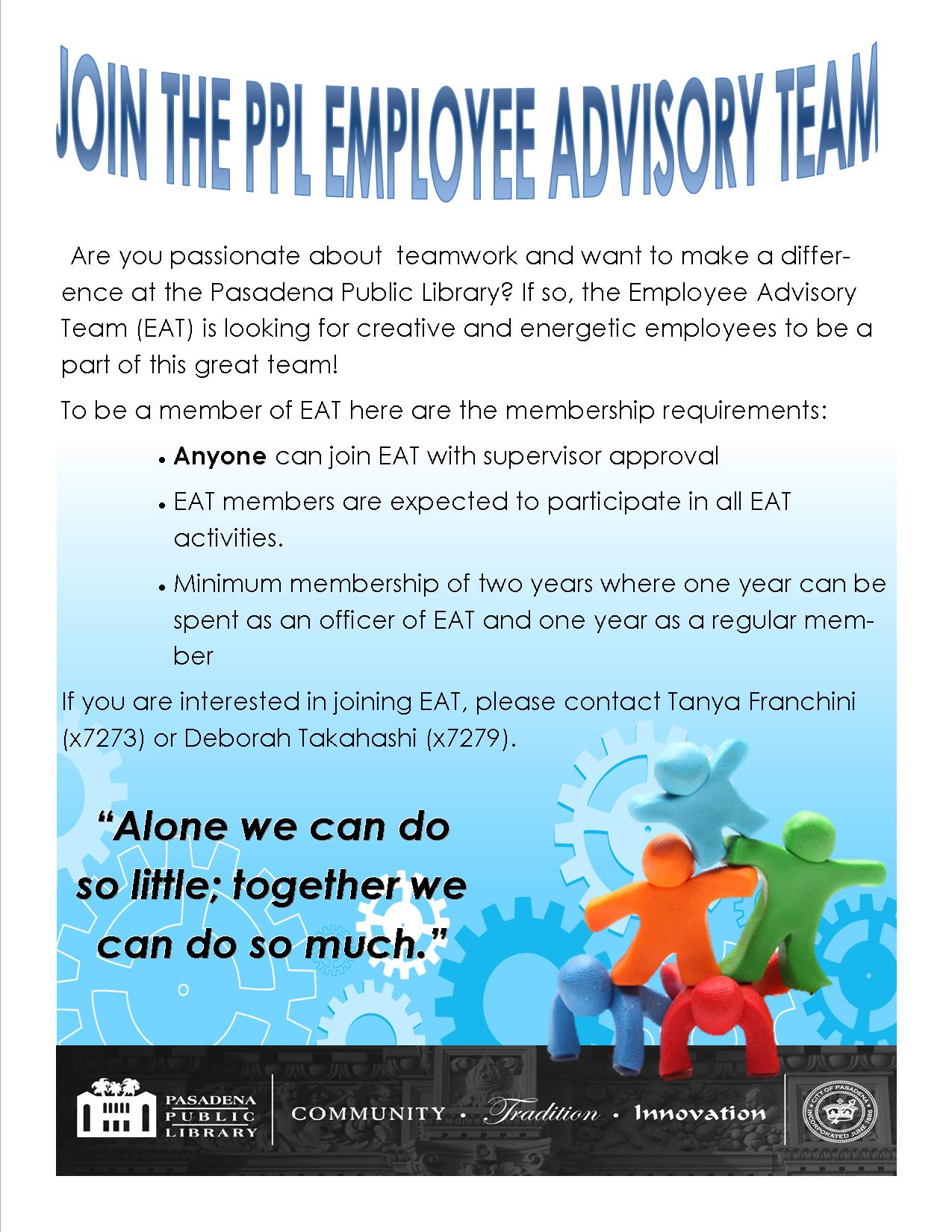“Shauna is straightforward and professional in how she handles difficult situations. She is genuine and you always know where you stand. She can be counted on to make good decisions during stressful times and always backs security.” -Mike Fanous
Monthly Archives: February 2016
EAT Wants YOU!
Are you passionate about teamwork and want to make a difference at the Pasadena Public Library? If so, the EAT wants YOU to join our team! We’re still looking for one more member to help us plan and execute Staff Day, the Holiday Party, and other employee initiatives. and all staff are welcome.
Contact Tanya Franchini (x7273) or Deb Takahashi (x7279) if you might be interested (even if you just want to ask some questions about it first).
See the flyer below for more information.
So You Want to Go to Library School?
Are you graduating from college and not quite sure what to do yet? Do you have a Bachelor’s and want to pursue higher education? Do you love working in libraries so much that you want to become the greatest librarian ever? If so, here is what you need to become a Librarian.
Q1. What kind of degree do I need to get to become a Librarian?
The Master of Library and Information Science (MLIS) is a graduate degree that will allow you to apply for Librarian positions in the massive library world (i.e., Public, School, Academic, Special Collections, Data Management, Cataloging, and Archives).
Q2. What schools can I apply to?
There are several MLIS programs in Southern California you might want to consider:
There are also out-of-state online programs you can apply to as well.
When researching schools, be sure to pay attention to their admission requirements such as a minimum GPA from your undergraduate degree or if you have to take the Graduate Record Examination (GRE). Be sure to research the costs and benefits of attending each school and see if they specialize in the type of librarianship you are interested in. I highly recommend visiting the campus and faculty if you plan on commuting to a local school. If you are considering an online program, take the time to read up on the program and see if it meets your expectations.
Q3. What’s the difference between an in-person program vs. an online program?
The difference between these programs boils down to personal learning styles, costs, and time. I chose to get my MLIS online because I was working fulltime and I didn’t want a big commute. Not to mention, I didn’t want to be up to my eyeballs in student loans.
When selecting an online program, keep in mind that about 90% of communication is done via e-mail or online. Most online programs have computing requirements so if your laptop is a dinosaur, it’s a good idea to replace if before starting class. As for coursework, you have to manage your time effectively so you don’t fall behind, which can be difficult when you have hundreds of pages to read and need to post to online discussion boards at least once or twice a week.
If you attend classes in-person, you do have the advantage of communicating directly to your professors and peers. If there is group work to be done, it is a lot easier to organize your peers in a traditional classroom since everyone is local. With an online program, there is a high probability that some of your peers live on the other side of the country so scheduling group work can be tricky.
The drawback to traditional in-person programs like UCLA and USC is cost and having to commute. If cost is a big factor in determining whether or not you want to apply, it’s good to see what scholarships are available and if you can receive financial aid in the form of grants and subsidized loans from the federal government. If you are hesitant to take out a loan, make sure to consider that it is an investment in your future that will help you achieve your goals. As for commuting, if you love the 405 and 5 freeways, then start stockpiling your audiobooks to get your through prime time traffic. However, the Metro train can get you close to USC if you want to avoid having to pay for an annual parking pass.
Q4. Does it cost money to apply?
Like any higher education program, there are application fees which vary from school to school. When researching the program, take time to review the application process along with the admission requirements.
Q5. If I have any more questions about attending library school, who can I talk to!
That’s easy! ME! If you have any questions in regards to applying to library school, please e-mail me at: dtakahashi@cityofpasadena.net or call me at ext. 7278 or ext. 7272.
Stay tuned for my next post about about applying for financial aid and how you can pay for library school by applying for scholarships and grants.
Good luck!
~Deb Takahashi


